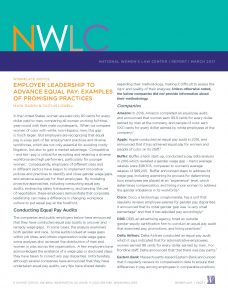Abortion rights, women of color, and LGBTQI+ people are under attack. Pledge to join us in fighting for gender justice.
By: Maya Raghu and Caitlin Lowell
 In the United States, women are paid only 80 cents for every dollar paid to men, comparing all women working full-time, year-round with their male counterparts. When we compare women of color with white, non-Hispanic men, this gap is much larger. But employers are recognizing that equal pay is a key part of fair employment practices and diverse workforces, which are not only essential for avoiding costly litigation, but also to gain a market advantage. Competitive – and fair– pay is critical for recruiting and retaining a diverse workforce and high performers, particularly for younger women. Consequently, employers of different sizes and in different sectors have begun to implement innovative policies and practices to identify and close gender wage gaps, and advance equal pay for their employees. By modeling proactive approaches, including conducting equal pay audits, embracing salary transparency, and banning the use of negotiation, these employers demonstrate that corporate leadership can make a difference in changing workplace culture to put equal pay at the forefront.
In the United States, women are paid only 80 cents for every dollar paid to men, comparing all women working full-time, year-round with their male counterparts. When we compare women of color with white, non-Hispanic men, this gap is much larger. But employers are recognizing that equal pay is a key part of fair employment practices and diverse workforces, which are not only essential for avoiding costly litigation, but also to gain a market advantage. Competitive – and fair– pay is critical for recruiting and retaining a diverse workforce and high performers, particularly for younger women. Consequently, employers of different sizes and in different sectors have begun to implement innovative policies and practices to identify and close gender wage gaps, and advance equal pay for their employees. By modeling proactive approaches, including conducting equal pay audits, embracing salary transparency, and banning the use of negotiation, these employers demonstrate that corporate leadership can make a difference in changing workplace culture to put equal pay at the forefront.
The report includes examples of companies that have engaged in the following practices to advance equal pay in the workplace. However, inclusion of a company in this report does not indicate endorsement of its practices.
- Conducting Equal Pay Audits
- Promoting Pay Transparency
- Standardizing Compensation-Setting and Eliminating Salary Negotiation
- Eliminating Unconscious Bias
- Other Promising Corporate Practices to Advance Equal Pay
- Public-Private Partnerships

